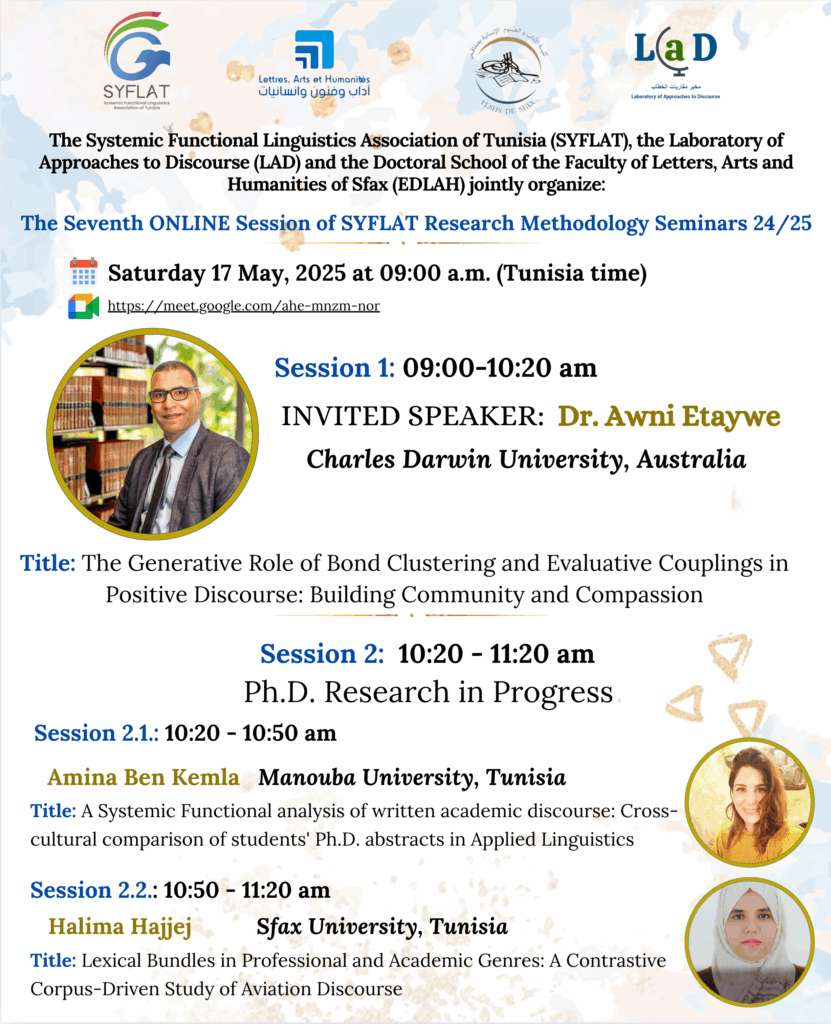ONLINE Session of SYFLAT Research Methodology Seminars 2024/2025
Session 1: 09:00 – 10:20 am
Session 2: 10:20 – 11:20 am
Ph.D. Research in Progress
Session 2.1.: 10:20 – 10:50 am
Amina Ben Kemla – Manouba University, Tunisia
Title: A Systemic Functional analysis of written academic discourse: Cross-cultural comparison of students’ Ph.D. abstracts in Applied Linguistics
Bio: I am an agrégée teacher in high school, holder of an MA degree in Linguistics and a third-year PhD student.
Session 2.2.: 10:50 – 11:20 am
Halima Hajjej – Sfax University, Tunisia
Title: Lexical Bundles in Professional and Academic Genres: A Contrastive Corpus-Driven Study of Aviation Discourse
Bio: I am Halima Hajjej, a second-year PhD student at the Faculty and Letters and Humanities of Sfax. I received a bachelor’s degree in English language, literature and civilization from the Higher Institute of Languages of Gabes and a master’s degree in linguistic studies from the Faculty and Letters and Humanities of Sfax. I am currently working on the use of lexical bundles in professional and academic genres, notably aviation accident investigation reports and PhD theses written in French and English. My research interests include genre analysis, corpus analysis, phraseology and aviation discourse.
ABSTRACTS
Dr. Awni Etaywe: The Generative Role of Bond Clustering and Evaluative Couplings in Positive Discourse: Building Community and Compassion
Abstract: In our interconnected yet increasingly divided world, exposure to hate, fear, genocidal rhetoric, authoritarian discourse, climate denial, and adversarial communication has become commonplace. This reality underscores the urgent need for a more compassionate and inclusive society and highlights the crucial role of language in shaping such a future. While much research stresses the importance of nurturing positive discourse and fostering compassion, comparatively little attention has been given to the linguistic mechanisms that make these outcomes possible. This presentation begins by defining key concepts to frame the discussion, offering a brief overview of how evaluative couplings and bond clusters operate in violent discourse (e.g., violent extremism, political discourse, and incitement to genocide). It then shifts focus to explore the constructive use of language in digital activism and positive environmental journalism. Drawing on examples from these domains, the presentation illustrates how clusters of bonds and evaluative couplings generate solidarity, community, and compassion, offering valuable models for positive engagement. Ultimately, this work contributes to discourse analysis by demonstrating how language – and broader semiotic resources – can be consciously harnessed to inform and promote ethical communication practices. It offers insights into how discourse analysts, institutions, individuals, and groups can stand at the forefront of positive change, equipped with the linguistic tools necessary to foster a more just, compassionate, and resilient global community.
Amina Ben Kemla: A Systemic Functional analysis of written academic discourse: Cross-cultural comparison of students’ Ph.D. abstracts in Applied Linguistics
Abstract: Drawing on Systemic Functional approach and Genre theory to language, this thesis cross-culturally compares the thematic choices in Thesis Abstract writing belonging to three different cultural and linguistic backgrounds. The corpus consists of a pool of 270 PhD abstracts in the field of Applied Linguistics, written between 2010 and 2024. The corpus was analysed using UAM corpus tool and SPSS software. The Textual annotation is based on the Textual metafunction. The Statistical analyses employ Kruskal Wallis, Dunn-Bonferroni’s, and Chi-square tests. On the other hand, the qualitative analysis investigates how thematic choices manifest in the subcorpora, exploring their lexicogrammatical patterns. This analysis also analyses how Theme types contribute to the rhetorical moves in academic writing. Preliminary findings indicate both cross-cultural differences and similarities in the use of Theme types, highlighting variations in thematic structuring across and among the three groups.
Halima Hajjej: Lexical Bundles in Professional and Academic Genres: A Contrastive Corpus-Driven Study of Aviation Discourse
Abstract: Previous research has not only emphasized the relationship between the forms and functions of lexical bundles (LBs) – defined as extended collocations and recurrent multi-word sequences that show a statistical tendency to go together (Biber et al., 1999) – but also their variation across genres, disciplines and languages (Biber et al., 2004; Hyland, 2008). Nevertheless, little attention has been paid to LBs within aviation discourse, notably across different genres and languages. To address this gap, the thesis analyzes a corpus of more than one million words, composed of aviation accident investigation reports and PhD theses written in French and English. It aims to investigate the frequency distribution, forms and functions of LBs and identify similarities and differences between the genres and languages under investigation. To this end, AntConc was selected as a concordancer to extract 3-6 word LBs, which will then be classified according to their structural and functional features. A mixed-method approach that combines quantitative and qualitative methods is adopted in the thesis.



